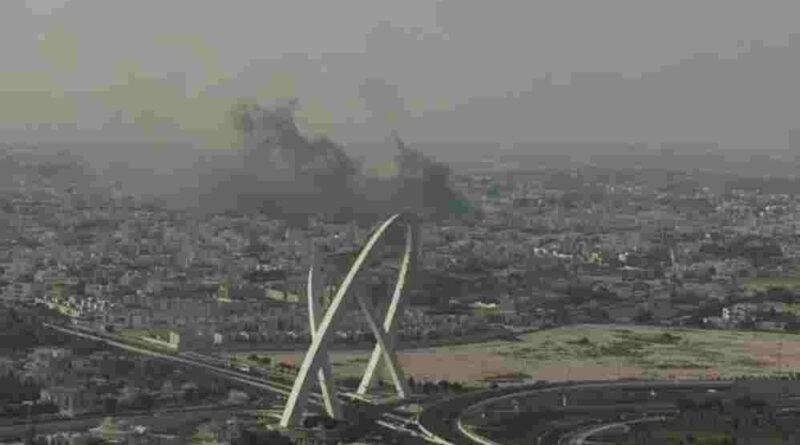Explosions Rock Doha as Israel Targets Hamas Leaders
Doha, Qatar—The quiet morning skyline of the Qatari capital was shattered when loud explosions shook parts of the city. Thick plumes of smoke rose over residential and commercial areas, leaving residents in shock as emergency services rushed to the scene. According to regional sources, the blasts were the result of an Israeli strike targeting senior Hamas figures believed to be operating from Doha.
A City Caught Off Guard
Qatar has long been regarded as a relatively safe and neutral ground in the Middle East. Known for its role in diplomatic mediation and international negotiations, the sudden eruption of violence has deeply unsettled both locals and the wider global community. Witnesses described the sound of “thunderous blasts” that rattled windows and sent people scrambling into the streets.
For many in Doha, this was not just another headline from a faraway conflict. It was a moment that brought the war in Gaza directly into their neighborhoods.
The Target: Hamas Leadership
At the heart of the strike was Khalil al-Hayya, a senior Hamas official and key negotiator in ongoing ceasefire talks. Reports suggest that while he was in the vicinity of the explosions, he survived the attack. Al-Hayya has become a critical figure in diplomacy after the loss of other Hamas leaders in recent months.
The strike appears to be a calculated attempt by Israel to disrupt Hamas’s leadership structure and apply pressure during delicate ceasefire negotiations. It also signals a bold step by Israel—hitting beyond Gaza and directly inside a country that has played host to mediation efforts.
Qatar’s Role Under Scrutiny
Qatar has positioned itself as a mediator between Israel, Hamas, and other international actors. Hosting political offices of Hamas has always been a sensitive issue, one that Doha defended as necessary for facilitating dialogue. The strike, however, places Qatar in an unprecedented situation—transforming it from a neutral host into a battleground.
For a country that prides itself on diplomacy and soft power, this escalation raises questions about whether its role as a mediator can remain credible or safe.
Global Shockwaves
International reactions poured in within hours of the strike. Qatar strongly condemned the attack, calling it a violation of its sovereignty and a dangerous precedent in regional politics. Neighboring Gulf states expressed concern that the violence could destabilize one of the region’s most stable capitals.
Global powers, already invested in efforts to secure a ceasefire in Gaza, warned that the strike could derail fragile negotiations. The United Nations and other international bodies emphasized the importance of continuing peace talks despite the escalation.
Impact on Ceasefire Efforts
Ceasefire negotiations had been ongoing, with hopes pinned on reaching agreements regarding hostages, aid deliveries, and the suspension of fighting. Israel’s decision to strike during this delicate phase risks dismantling weeks of backchannel diplomacy.
Trust—already thin—may be impossible to restore in the short term. Hamas leaders now face heightened insecurity, while mediators may find it harder to bring parties back to the table. The symbolism of striking a mediator’s capital underscores the fragility of the entire peace process.
Human Cost and Civilian Fear
Beyond politics and strategy, the explosions left ordinary people in fear. Doha’s residents—families, workers, and students—were suddenly thrust into an atmosphere of war. The images of smoke, emergency vehicles, and panicked crowds highlighted the reality that conflict does not stay confined to borders.
For many, it was a reminder of how quickly geopolitical decisions ripple into daily lives.
What Comes Next?
The immediate question now is whether ceasefire talks can survive such a blow. Some analysts suggest that Hamas may pull back from negotiations, while Israel might see the strike as strengthening its bargaining position. Others warn that escalation outside Gaza risks expanding the conflict into new territories and dragging more nations into the crisis.
What is clear is that diplomacy has suffered a severe setback. The challenge for the international community will be to restore dialogue before the violence deepens further.
Conclusion
The explosions in Doha mark a turning point in the ongoing Middle East crisis. For the first time, Qatar—a nation known for diplomacy—has become a frontline in a conflict it has tried to mediate. The strike on Hamas leaders inside Doha has not only shaken the city but also destabilized the already fragile path toward peace.
The world now watches closely: Will this act ignite further escalation, or will it push leaders back to the negotiating table with even greater urgency?
Disclaimer
The information and content shared on digitalgithub.com — including articles, blogs, news, guides, and other resources — is intended for general informational and educational purposes only. We do not guarantee the completeness, reliability, or suitability of any information. Always seek the guidance of a qualified professional before making decisions based on the information you read. Use this site at your own risk.

